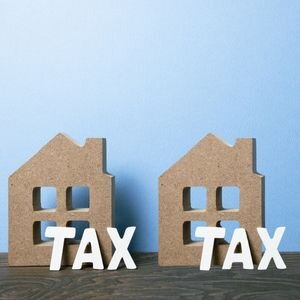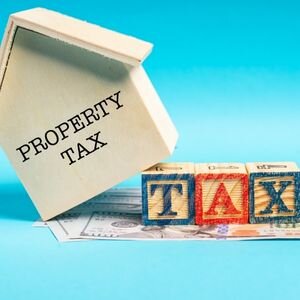
Understanding Property Tax Rates in Granbury, TX
Understanding property tax rates in Granbury, TX, is essential for homeowners who want to manage their financial obligations effectively. Various taxing authorities, including the Hood County Appraisal District, school districts, and other local entities, determine property tax rates in Granbury.
These agencies assess property values annually to calculate taxes owed. Homeowners should be aware that the property tax rate is expressed as a percentage of the home’s assessed value.
The total tax rate comprises multiple components, such as county taxes, city taxes if applicable, and school district taxes. Changes in these rates can significantly impact a homeowner’s annual expenses.
It’s important for people to know about any public meetings or planned changes to tax rates that could have an impact on their budget. Homeowners can make better financial choices and plan for any changes in their tax liability if they know how these factors work together in Granbury’s property tax system and understand how our process works.
How Granbury, TX, Property Taxes Are Calculated
In Granbury, TX, property taxes for homeowners involve several key components. The property tax rate is determined by local taxing authorities, including the county, city, school districts, and other special districts, each setting its respective rates.
All properties under their jurisdiction are subject to a composite tax rate, which is the sum of all of these specific rates. A homeowner’s property’s assessed value is an important factor in this computation.
The Hood County Appraisal District sets this assessed value every year. It shows how much the property is worth on the market as of January 1st of each year. Once the market value is known, any exemptions that apply, like homestead exemptions or discounts for seniors, are subtracted to get the taxable amount.
Property taxes are calculated by applying the combined tax rate to this taxable value. Homeowners in Granbury should be aware that these tax rates can fluctuate annually based on budgetary requirements from local governments and voter-approved measures impacting public services like schools and infrastructure.
Knowing about these things helps Granbury homeowners predict changes in their yearly property tax bills and make plans for the financial responsibilities that come with being a homeowner.
Key Factors Influencing Property Taxes in Granbury, TX
Homeowners in Granbury, TX, should understand the key factors influencing property taxes. One primary factor is a property’s assessed value, which the Hood County Appraisal District determines based on current market conditions and comparable home sales in the area.
Local government agencies, such as school districts, city governments, and special districts like hospitals or utility services, also have a big say in how much taxes people pay to pay for public services. Property tax rates can also change based on the state of the economy. For example, when the economy is growing or shrinking, tax rates may be changed to satisfy budget needs.
Additionally, exemptions such as those for homesteads, seniors, veterans, or disabled individuals can significantly reduce a property’s taxable value. Changes in legislation or voter-approved measures at both state and local levels can shift how property taxes are calculated and applied.
Homeowners can better prepare for changes in their property tax costs by knowing these things. If you’re located outside Granbury but facing similar tax concerns, we buy houses in Denison and can walk you through your best selling options.
Comparing Granbury, TX, Property Tax Rates with Neighboring Areas

When examining property tax rates in Granbury, Texas, it’s essential to compare them with those of neighboring areas to gain a comprehensive understanding. Various factors influence Granbury’s property tax rate, including local influence, Granbury’s property tax rate, government budgets, school district funding needs, and municipal services.
In comparison, nearby cities such as Weatherford and Cleburne may have different rates due to their unique economic conditions and service requirements. For instance, Weatherford might have slightly lower rates because of a broader tax base or differing budgetary priorities.
Conversely, Cleburne’s property taxes could be higher if the area invests more in public infrastructure or educational initiatives. Homeowners in Granbury benefit from analyzing these variations to appreciate how local policies impact their financial obligations.
By identifying these differences, residents can make informed decisions about real estate investments and assess the relative affordability of living in Granbury compared to its surrounding regions. Understanding these nuances helps homeowners anticipate potential changes in taxation and plan accordingly for future fiscal responsibilities.
The Impact of Property Value Assessments on Taxes in Granbury, TX
Property value assessments are crucial in determining property tax rates for homeowners in Granbury, TX. The local appraisal district evaluates the market value of each property, which directly impacts the amount of property taxes owed.
When property values go up, so do the assessed values. This means that homeowners have to pay more in taxes. This procedure makes sure that property taxes are based on current market conditions, which means that tax bills can change a lot from year to year.
Understanding how these assessments are conducted is essential for homeowners looking to manage their financial obligations effectively. The appraisal district uses various methods and data points to determine fair market value, including recent sales data and comparable property analysis.
If homeowners think their assessed values are wrong or don’t agree with them, they can challenge them. This could cut their taxes. Granbury residents can better deal with the complicated world of property taxes based on assessments by staying up to date on changes in how assessments are done and keeping in touch with the appraisal district.
Exemptions and Reductions for Granbury, TX, Property Taxpayers
Granbury, TX, homeowners have several opportunities for property tax exemptions and reductions, which can significantly alleviate their annual tax burden. One of the most common exemptions available is the Homestead Exemption, which reduces the assessed value of a primary residence, thereby lowering the overall property tax owed.
Taxable value is further reduced for those who are 65 and older or who have disabilities, thanks to additional exemptions. Additionally, certain exemptions may be available to veterans who have service-connected disabilities.
To help citizens while keeping important services running, school districts often grant different exemptions. To make sure that eligible homeowners get the benefits they are entitled to under Hood County rules, these exemptions need to be applied for every year on time.
Understanding these various options can help Granbury residents effectively manage their property taxes and make informed decisions about their real estate investments.
How to Appeal Your Property Tax Assessment in Granbury, TX
If you own a home in Granbury, TX, knowing how to appeal your property tax estimate can help you keep your costs down. The first thing you need to do to file an appeal is carefully read over your property tax letter to look for mistakes or problems.
If you think your home’s estimated value is too high compared to other homes in Granbury that are similar, get proof, like recent sales data from homes in the area that are similar. Next, send an official protest to the Hood County Appraisal District by the due date, which is usually written on your assessment notice.
Present your evidence clearly and concisely during the appeal hearing to support your claim for a reduced valuation. Hiring a professional appraiser or tax consultant familiar with Granbury’s real estate market may be beneficial in strengthening your case.
It’s important to know the rules and deadlines in your area, because missing them could mean you lose your right to appeal for that year. If you win your appeal, your property tax payment could go down a lot. This would help you financially while making sure that property values in the Granbury region are fairly taxed.
Upcoming Changes to Property Tax Legislation in Texas and Their Effects on Granbury

Upcoming changes to property tax legislation in Texas could significantly impact homeowners in Granbury. With the state’s ongoing efforts to reform property tax rates, residents should know how these modifications might affect their financial obligations.
Recent legislative sessions have focused on increasing transparency and ensuring taxpayers understand how their money is utilized. For Granbury homeowners, this means potential shifts in appraisal processes and caps on annual increases, which could affect the overall property tax burden.
Also, new policies aim to improve funding for public services without raising taxes on private properties too much. Granbury residents need to know about these changes in the law so they may expect changes in their property tax payments and plan for them.
The evolving landscape of Texas’s property tax laws illustrates the value of staying informed about local government decisions and their direct effects on homeownership costs within the community.
At What Age Do Seniors Stop Paying Property Taxes in Texas?
In Texas, seniors are often curious about how their age affects property taxes, especially in areas like Granbury. While seniors do not completely stop paying property taxes at a certain age, they may qualify for certain exemptions to reduce their tax burden.
The Over-65 Homestead Exemption is available to homeowners in Texas who are 65 or older. It lowers the taxable value of their property by a lot. This is quite important for older people who own homes in Granbury and wish to keep track of their costs.
Additionally, once this exemption is applied, the school district taxes on the residence are frozen at the amount paid in the first year of eligibility. Seniors in Granbury must understand these provisions and consult with local tax authorities or a property tax advisor to fully benefit from available exemptions and ensure they are not overpaying their property taxes as they enjoy their retirement years.
Older Texans who own their homes outright can benefit greatly from financial planning advice that takes these subtleties into account.
How Do I Find Out My Property Tax Rate in Texas?
For Granbury homeowners in particular, there are a number of critical processes to determine your property tax rate in the Lone Star State. To begin, get in touch with the Hood County Appraisal District. They are the ones that decide how much a property is worth and can give you all the information you need about the property tax rates that apply to your house.
Visit their official website or office to access the latest property tax data and assessment details. Reviewing your annual property tax bill will reveal the specific rate used to calculate your taxes.
This bill usually lists the different parts of the tax rate, such as taxes for the county, city, and school district. The Texas Comptroller’s Property Tax Assistance Division is another useful resource. It has online tools and databases that let people look up the appraisal and tax rates for their property.
Staying informed about local government meetings where budget decisions are made can also help you understand changes in property tax rates over time. By utilizing these resources, Granbury homeowners can efficiently determine their property tax obligations and plan accordingly.
What Is the Tax Rate for Hood County?
Hood County, which encompasses the city of Granbury, Texas, has a property tax rate that is crucial for homeowners to understand when calculating their annual property expenses. Various local government entities determine the property tax rate for Hood County, including the county itself, school districts, and special taxing districts. For 2023, the base property tax rate in Hood County stands at approximately
41% per $100 of assessed property value. However, this rate can vary depending on additional levies imposed by specific areas within the county. For example, Granbury Independent School District and other local municipalities contribute to an overall effective tax rate that might be higher than the base county rate. Homeowners should also consider any exemptions they may qualify for, such as homestead or senior citizen exemptions, which can significantly reduce their taxable value and thus lower their overall tax burden. Understanding these components is essential for accurately estimating your property taxes in Hood County and effectively managing your financial planning as a homeowner in Granbury.
How Property Taxes Affect Home Affordability in Granbury, TX. Property taxes play a pivotal role in
Property taxes play a pivotal role in homebuyers’ evaluation of long-term viability in Ranbury, TX. While the purchase price of a home is a one-time cost, property taxes represent a recurring expense that directly impacts monthly budgets and overall home affordability.
Higher property tax rates can increase the monthly cost of owning a home, particularly for buyers using escrow accounts managed by their mortgage lenders. As a result, a home that seems affordable on the surface may stretch a buyer’s budget once annual property taxes are factored in.
In Granbury, prospective buyers are encouraged to calculate their total cost of ownership—including property taxes—before making a purchase decision. Tools like online tax calculators or consultations with local real estate agents and lenders can help provide a clearer picture of expected expenses.
Families and investors can avoid unexpected costs and choose homes that align with their long-term financial goals in Granbury by considering property tax implications early in the homebuying process.
Seasonal and Annual Property Tax Payment Deadlines in Granbury, TX

Granbury homeowners must be mindful of the seasonal and annual deadlines for property tax payments to avoid penalties and interest. Property taxes are due annually in Texas, with statements typically mailed out by the Hood County Tax Assessor-Collector in October.
The full payment is due by January 31st of the following year. If the payment is not received by this date, interest and penalty fees begin to accrue starting February 1st. These late fees can add up quickly, creating additional financial stress for homeowners.
Installment payment plans may be available through the county for those unable to pay in full by the deadline. Inquiring early about these options is essential to remaining in good standing and avoiding collection actions.
Setting reminders and enrolling in automatic payment options (if available) can help residents stay current and avoid unnecessary costs. By adhering to tax deadlines, Granbury homeowners can maintain financial health and prevent disruptions to property ownership.
How Rising Property Values in Granbury Affect Tax Bills
Granbury has experienced a steady rise in home values over recent years, driven by population growth, economic development, and increased demand for housing. While rising property values are generally a positive sign of a strong housing market, they also lead to higher assessed values—and, consequently, higher property tax bills.
When the Hood County Appraisal District reassesses property values annually, any increase in a home’s appraised market value raises its taxable value unless mitigated by an exemption or a capped increase under Texas law. For homeowners with fixed incomes or tight budgets, these increases can create challenges in maintaining affordability.
To manage this, it is essential to take advantage of all eligible exemptions and stay proactive by reviewing your appraisal notice each year. If you’re unsure how to approach this, Southern Hills Home Buyers can help by guiding you through your options. And if you’re located in East Texas, you can also sell your home for cash in Tyler quickly and easily with our support.
Staying informed about market trends and neighborhood developments can also help homeowners anticipate future increases and adjust their financial plans accordingly.
Helpful Granbury, TX Blog Articles
- Is Granbury, TX, The Ideal Place To Call Home
- Granbury, TX: Real Estate Insights Into The Best And Worst Neighborhoods
- Explore Granbury, TX Neighborhoods
- Discover Free Housing-related Activities In Granbury, TX
- Discover The Unique Charm Of Granbury, TX Real Estate And Historic Homes
- Understanding Granbury, TX, Property Tax Rates For Homeowners
- How To Sell Your House By Owner Successfully in Granbury, TX
- Expert Tips For Selling Your Inherited House In Granbury, TX
- Optimal Seasons For Selling Your Home In Granbury, TX
- Strategies To Prevent Home Foreclosure In Granbury, TX

| TAX BASED | TAX PAYMENT | TARRANT COUNTY | TARRANT COUNTY, TEXAS | TAX YEAR | MEDIAN |
| MEDIAN HOME PRICE | U.S. | CALCULATOR | PRICE | MEXICAN | MEXICO |
| REVENUE | DFW AREA | DFW METROPLEX | GRANBURY TX 76048 | GRANBURY,, TX 76048 PHONE |
![HOA Foreclosure Process on a House In [market_city]](https://image-cdn.carrot.com/uploads/sites/21284/2024/10/HOA-Foreclosure-Process-on-a-House.png)
